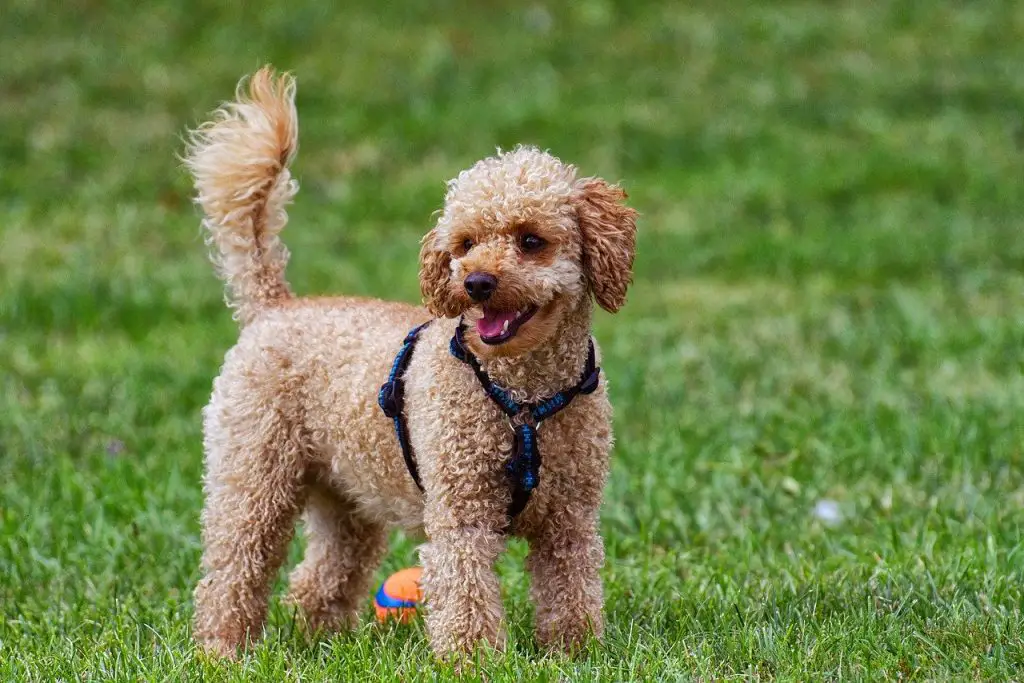Overview
Group: Non-Sporting Group
AKC Breed Popularity Rank: No. 7 of 195
Height: Over 15 inches (Standard)
Weight: Male – 60-70 lbs; Female – 40-50 lbs
Life Span: 10-18 years
Temperament: Intelligent; Very Active; Proud
Without a doubt, the Poodle is the most fashionable among the dog breeds. With its stylish doggy cuts via professional groomers, it certainly is no wonder that the breed is very popular among celebrities. However, behind that aristocratic façade is a very intelligent and athletic dog that is perfect for all families, regardless of their socioeconomic status.
History
Although the French have accepted the Poodle as their National Dog, the breed originated from Germany. As early as 400 years ago, the Germans have developed the Poodle as a duck hunter. The result is a dog with a dense, curly coat that can withstand water and the elements, high intelligence, excellent swimming ability, and retriever instincts. In fact, the Standard Poodle is the only dog in the Non-Sporting Group that is eligible for and can participate in the Retriever Hunting Tests being conducted by the AKC. With time, the Poodle also developed a keen sense of smell, making it a great truffle hunter.
If you thought that the fashionable doggy cuts were meant for show, in those early years, they served a practical purpose. To enable the Poodle to move freely, hunters shaved along the neck, legs, and tail, but left the coat intact on the chest, hips, and leg joints. These tufts of intact coat are called “pompons” with an “n” at the end (not “pompoms”, as many dog lovers continue to call them).
As the Poodle’s popularity spread throughout Europe and the rest of the world, breeders eventually bred the breed down into two diminutive versions, the Miniature and the Toy (developed in America). No matter which version you choose, all Poodle variations possess the same high standards that have been set forth by the AKC and dog fanciers throughout the world.
General Appearance
The differences in the three Poodle varieties lie in their respective heights: the Standard is more than 15 inches at the shoulder, the Miniature is 15 inches or below, and the Toy should not exceed 10 inches.
All Poodle varieties possess the same builds and proportions. Their coat is naturally curly and dense throughout the entire body, and harsh in texture. Despite its dense coat, it is low allergen, making the Poodle an ideal pet for individuals with allergies.
Poodles are very eager, active, and intelligent dogs, displaying great versatility. Because they are very smart dogs, this makes them very easy to train.
Nutrition
Poodles are bundles of energy, so they need lots of protein and fats in their diet. Make sure you ask your breeder you purchased your puppy from or your veterinarian what dog food is best for your dog, according to their size, age, and level of activity. However, always practice moderation especially in the giving of treats during training. If you overdo it, you may find yourself with an overweight or obese dog.
Grooming
Poodles need to be brushed daily to prevent matting near the roots. For this reason, a good preventive measure is to keep your dog with a short trim. If matting occurs, you will need to shave off all its fur.
Most Poodle owners learn to trim their dogs themselves. But if you prefer a professional groomer, you may choose between four main types of clips – the Puppy Clip, the English Saddle, the Continental Clip, and the Sporting Clip. Other Poodle haircuts include the Bikini or Summer Clip and the Teddy Bear Clip.
Exercise
Poodles need to be exercised daily because of their high activity levels. You can take them out running or during long walks. You can keep their retriever instincts active by playing fetch with them, using balls, toys, or sticks. You can also bring them with you for a swim.
Training
Because of their intelligence, Poodles are easily trained. The key to training is through consistency and by making training sessions fun for them. Since they love people and are very eager to please, the best training should include the owner and his/her family in order to forge strong bonds between them and their dog.
Health
Most Poodles who come from responsible breeders have been carefully screened for hereditary medical conditions. However, owners should still watch out for health issues that are common in the breed, such as hip dysplasia, idiopathic epilepsy, and von Willebrand’s disease. Standard Poodles are at risk for developing bloat and sebaceous adenitis. On the other hand, Miniatures and Toys may develop orthopedic disorders, namely luxating patella or Legg-Calve-Perthes.
Costs
Standard Poodle puppies cost $1,000 on average, and can go as high as $2,400 to $5,500. Miniature Poodles have an average cost of $800, with championship line puppies ranging from $2,400.00 to $8,000.00. Toy Poodles are more expensive with an average cost of $1,100, and a range of $3,300.00 to $8,000.00 for championship line dogs. When you factor in dog food, health care, toys, and grooming costs, the upkeep may cost you between $500 and $2,000.
Poodles, however, are great investments for dog lovers who want to own a smart, gorgeous dog. This is especially true for individuals who love to have a pet but are prevented from doing so because of health reasons.
SOURCES:
1) Poodle https://www.akc.org/dog-breeds/poodle-standard/
2) Poodle Diet Food https://www.petcarerx.com/article/poodle-diet-food/503
3) Poodle Cuts and Hairstyles https://www.petcarerx.com/article/poodle-cuts-and-hairstyles/1160
4) 10 Haircuts for Poodles https://www.animalwised.com/10-haircuts-for-poodles-265.html
5) Standard Poodle Puppies for Sale https://www.nextdaypets.com/Poodle-Standard.htm
6) Miniature Poodle Puppies for Sale https://www.nextdaypets.com/Poodle-Miniature.htm
7) Toy Poodle Puppies for Sale https://www.nextdaypets.com/Poodle-Toy.htm


